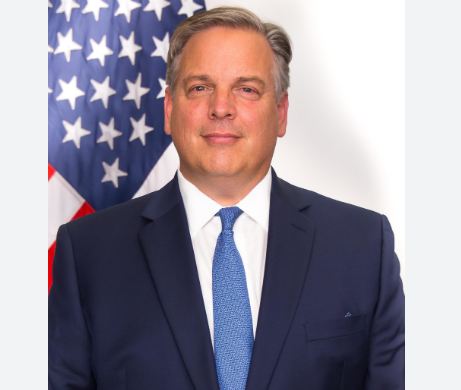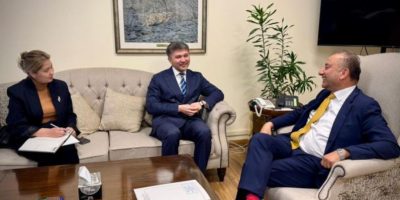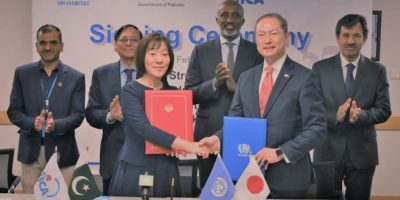US, Pakistan development partnership marks 75 years of progress

ISLAMABAD, NOV 18 /DNA/ – U.S. Ambassador Donald Blome highlighted the enduring partnership between the United States and Pakistan during a commemorative event attended by Minister for Planning, Development, and Reform Ahsan Iqbal and other distinguished guests.
The partnership, spanning more than 75 years, has resulted in significant infrastructure developments across Pakistan, including vital projects in transportation, education, power distribution, and water management. These initiatives have directly improved the lives of millions of Pakistani citizens.
“These projects continue to transform lives and create opportunities for individuals in all parts of the country,” stated Ambassador Blome, emphasizing the tangible impact of the long-standing bilateral cooperation.
The U.S. commitment to Pakistan’s development has manifested through the construction of roads, bridges, primary schools, universities, electric transmission lines, and water systems, demonstrating a comprehensive approach to infrastructure development.
Since 2005, the United States government has invested close to $2 billion in infrastructure across Pakistan. The United States was one of the first countries to recognize Pakistan after its formation, and our development partnership started immediately and has grown from there. Some of the most famous examples are the Tarbela and Mangla Dams, which the United States helped to construct in the 1960s and 1970s. In 2013, we upgraded both dams to make sure they continued to meet the needs of another four million Pakistanis. And the work to maintain and upgrade those continues today.
We have also partnered with local governments to expand access to healthcare and education by rebuilding and refurbishing more than 60 health centers and hospitals, including a new state-of-the-art burn and trauma center in Peshawar, and a total of 345 primary, secondary, and high schools. In higher education, the United States has partnered with Pakistan to establish top-notch institutions, including IBA Karachi, the Lahore University of Management Sciences, and the Centers for Advanced Studies in Water, Energy, and Food Security, which you have heard about today.
While we celebrate the benefits our partnership has delivered for the people of Pakistan, we should also acknowledge what made us so successful in the first place. And that is the United States’ approach to development.
First, our development assistance is provided without loans. Instead, we provide grants that allow communities to benefit from modern infrastructure without the long-term burdens of debt payments.
Second, we invest in people, not just physical infrastructure. U.S. projects prioritize job creation and capacity building for local people. From the construction of roads and bridges to the establishment of university campuses and healthcare centers, our programs create jobs, they promote entrepreneurship and enhance local expertise – all of which put more money into the local economy.
Finally, the U.S. approach ensures that infrastructure investments serve the local community and provide services and opportunities directly to the people. Whether we are rehabilitating irrigation canals, reconstructing schools, or providing solar energy solutions, our projects directly serve local needs and ensure that communities can maintain them.
Taken together, this means that the people of Pakistan continue to see a return on these investments, long after the projects have been completed.
Looking ahead, the United States’ investments in infrastructure will continue to drive growth and opportunity in Pakistan. Our partnerships in hydropower and solar electrification will be the cornerstone of Pakistan’s shift toward renewable energy and climate-smart growth. Our road projects have laid the foundation for enhanced trade, connecting Pakistani businesses to global markets. And our investments in education will continue to nurture future generations of leaders and experts.
This enduring legacy ensures that future collaboration between the United States and Pakistan will continue to be grounded in a foundation of shared values, mutual respect, and a commitment to progress. We look forward to continuing to work together to invest in Pakistan’s future. Thank you all for your longstanding support and for that partnership.
Related News

Kazakhstan envoy meets climate minister
ISLAMABAD, 11 FEB (DNA) — Kazakhstan’s Ambassador to Pakistan, Yerzhan Kistafin, on Wednesday called on Federal Minister forRead More

Japan, UN-Habitat, JICA partner for safer Pakistani schools
ISLAMABAD, FEB 11 /DNA/ – The Government of Japan, the United Nations Human Settlements ProgrammeRead More


Comments are Closed